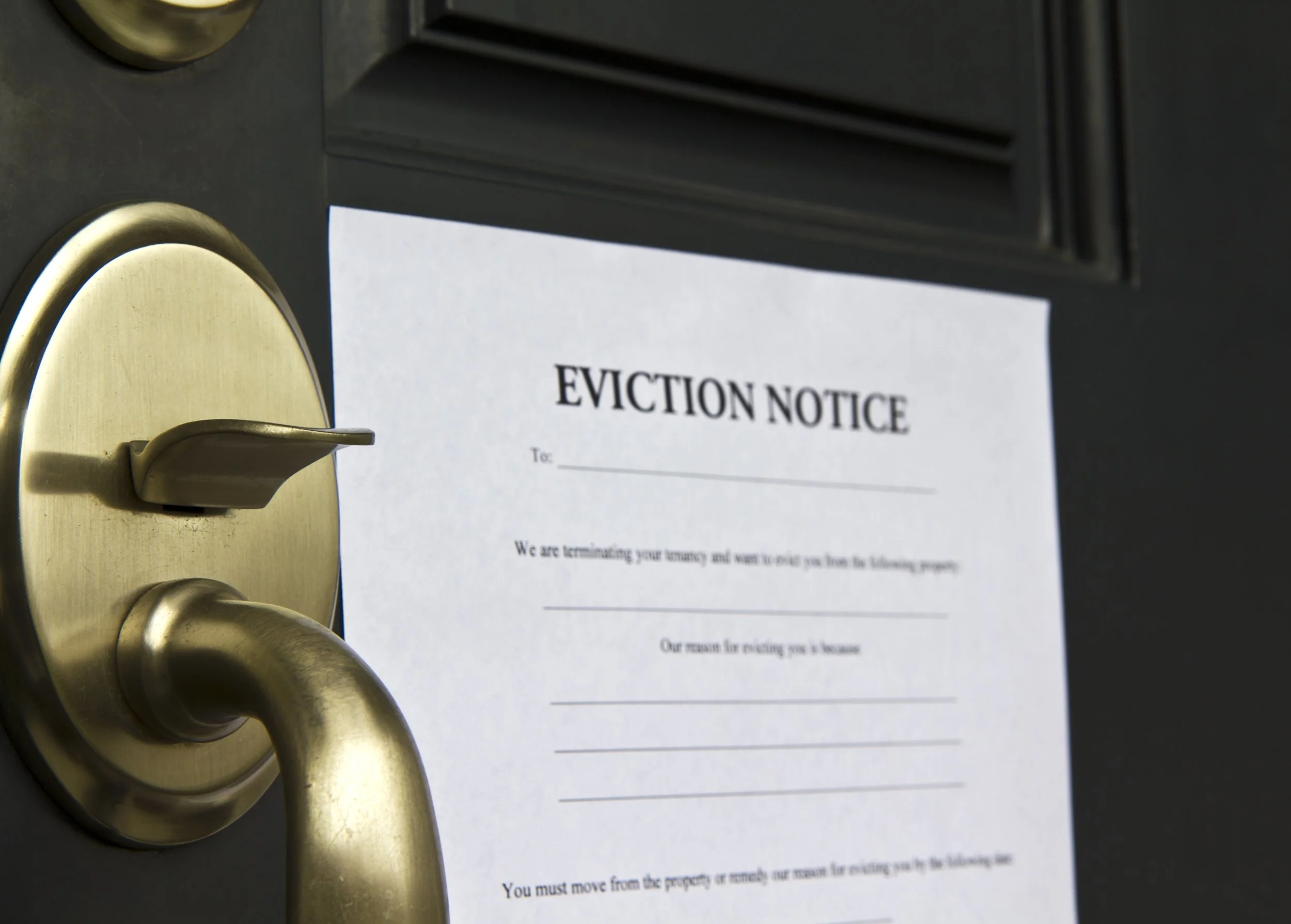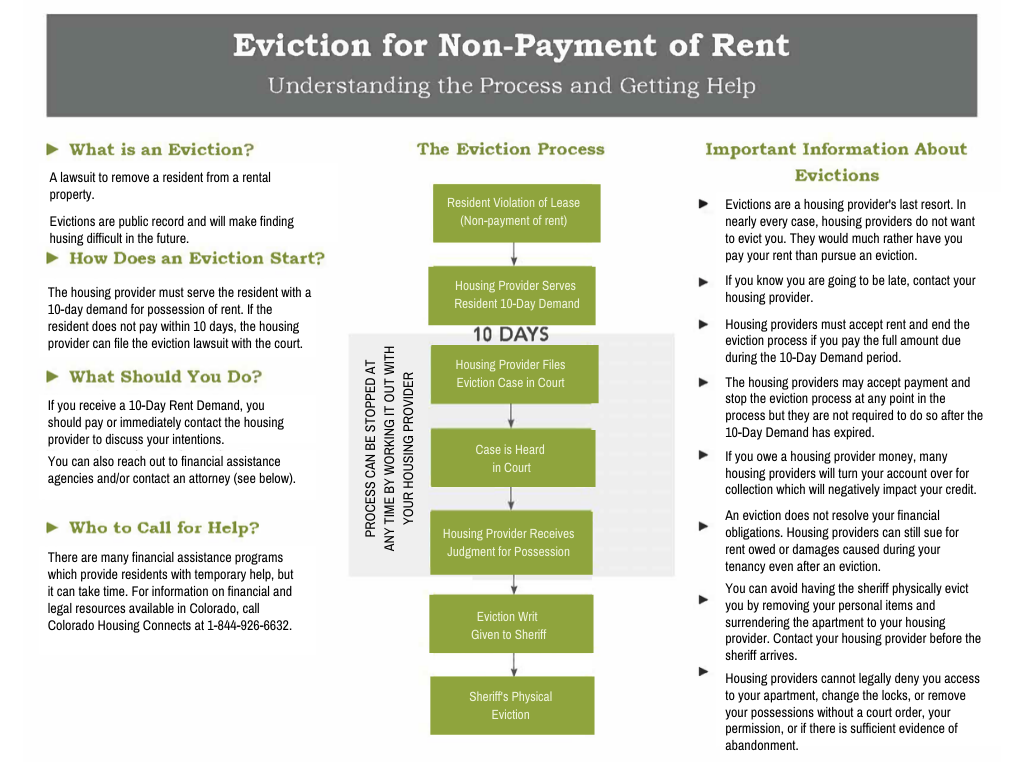Evictions
A lease is a rental agreement signed between two parties, a housing provider and a resident, which signifies that both parties agree to the terms of the lease. If a resident defaults on the lease or doesn’t voluntarily return the property, the process to get the property back (an eviction) can take between two and four months. The timeframe depends on the county and fact pattern.
If a resident is evicted in Colorado, the resident is allotted a 10-day grace period before a housing provider can begin the eviction process.
The hope is that Colorado residents never have to experience an eviction. Colorado state law identifies legal cause of eviction as the resident failing to fulfill their obligation to pay rent or other monetary payments to housing providers, or committing a non-monetary violation of the lease, including a serious violent act. It is the resident’s responsibility to fully understand what behavior, actions or inappropriate uses of the rental unit serve as grounds for eviction. It is also important that residents have a grasp on how the eviction process works.
Evictions are a housing provider’s last resort. In nearly every case, housing providers do not want to evict their residents.
The Eviction Process
-
A housing provider must first serve a resident a written demand that normally expires 10 full days* after it has been served, before midnight. The demand may be posted on the door of the premises, delivered to the resident, or delivered to someone in the resident’s household over 15 years old. *Different periods of time may apply to different types of housing.
The demand will either be a Notice to Cure (also referred to as a Demand for Compliance or Possession) or a Notice to Quit or Vacate. A Notice to Cure allows the resident the option of addressing the problem within the 10-day window or leaving the rental property. A Notice to Quit or Vacate for a repeated violation will notify the resident that they have 10 days to exit the rental property. A Notice to Quit or Vacate for a substantial violation will notify the resident that they have three days to exit the rental property.
If the resident fails to meet the demand within the required time, the housing provider has the option to take the resident to court.
-
If the eviction process moves to court, the resident will be contacted directly (and in some cases, by mail) with a Summons and Complaint, which will provide them with a court date (also called a return date or first appearance date).
The Summons and Complaint must be served to the resident at least seven days before and no more than 14 days after the given court date.
-
If the resident fails to appear on the notified court date, the court will be given no choice but to issue an Eviction Order called a “Possession Judgement,” and the resident can be removed from the rental property after 48 hours.
The resident can also attempt to reach an agreement with the housing provider and his/her attorney out of court, before court proceedings begin, if both parties wish to pursue this option.
If the resident feels that they have grounds to dispute the eviction, they have the right to file a Response or Answer to the Summons and Complaint* with the court and an additional hearing date will be set, which is usually within five business days after the first appearance date.
-
The housing provider must prove that:
There was an oral or written agreement for occupancy between the housing provider and the resident;
The resident violated the agreement or failed to move out of the rental property after the lease expired;
The resident was served a 10-day demand upon violation or expiration of the lease;
The resident did not comply with the demand within the required 10-day period.
The resident may present their defense. If the resident requires more time to prepare their defense for trial, they can request additional time at the first appearance date. However, the court normally requires the resident to pay a rent bond to the court as a condition of such extension.
-
If the resident wins, they will be allowed to reside in the rental property.
If the housing provider wins, Judgment for Possession will be granted to them and they have the right to proceed with a Writ of Restitution. The Writ of Restitution stipulates that 48 hours after the court order is issued, the local sheriff can execute on an official order to oversee a physical move-out of the resident from the premises.
In all Colorado locations except Boulder, the Writ of Restitution can be issued 48 hours after the court proceedings. In Boulder, the Writ of Restitution is issued on the first appearance court date. These laws are different for owner-occupied mobile homes parks.
-
On a date and time set by the housing provider and the sheriff, as outlined by the Writ of Restitution, the housing provider normally has one hour to physically evict the resident under the supervision of an officer of the law.
This date and time will not be provided to the resident in order to protect the officer. If the resident has failed to move out of the rental property before an officer of the law arrives, the housing provider has the right to remove the residents’ belongings outside, normally onto the lawn or the street, under the supervision of an officer of the law. Neither the officer nor the housing provider is responsible for the safety of the residents’ belongings once they are outside.
Once the physical eviction is complete, the housing provider can further choose to attempt to collect the money owed to him by the resident. If the money owed is $7,500 or less, the housing provider can sue in small claims court.
For more information on evictions, see evictions procedures here. For a list of nonprofits that can assist in an eviction situation, please see County Resources and Colorado Resources on this site.


